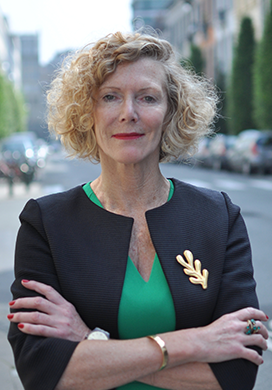Today Stephen Fidler leaves the post he has held as Brussels bureau at The Wall Street Journal and Dow Jones Newswires since October 2009 to take up a new role in London running the paper’s Brexit coverage. Part of a team of WSJ reporters named as a finalist for the Pulitzer Prize in 2011 for their coverage of the euro-zone debt crisis, he will leave a hole in the Brussels media landscape.
Before joining the WSJ in London in March 2009, Stephen spent 22 years with the Financial Times in senior roles, including international capital markets editor, Latin America editor, defence and security editor, and U.S. diplomatic editor, based in Washington DC. Previously, he spent almost a decade as a correspondent for Reuters in London, New York and the Middle East.
#BrusselsCalling interviewed Stephen as he prepared to move on.
Q: As an Englishman, how do you feel about leaving Brussels, the heart of the European project, just as Brexit negotiations are beginning?
A: You know, on the news side of The Wall Street Journal, we’re expected to leave our feelings aside. I came here in 2009, at a time of some complacency that Europe would escape the worst of the financial crisis. In fact, the crisis lingered for much longer here than elsewhere. On Brexit, as I head back to London, I’m struck by the difference in expectations about the negotiations on the two sides of the English Channel.
Q: Did the EU’s leaders bring Brexit upon themselves? Or did the media (UK in-country and in Brussels) play a role?
A: I think the main underlying reason for Brexit was English exceptionalism. If the question relates to whether EU leaders could have conceded more to David Cameron before the referendum in 2016, possibly. But I don’t know whether it would have made any difference to the outcome.
I don’t know either whether the anti-EU British press changed minds or merely confirmed people in their views. In fact, I don’t think the referendum vote can be attributed to one or two causes but only to a complicated combination of causes.
Q: What are the main changes to the role of a Brussels correspondent that you have witnessed during your time here? For better or for worse?
A: There is probably more interest in the European Union now, not least because it appears more under threat than it ever has. But there is a reason there are so many business representations here and lobbyists: because it is more than ever Europe’s business regulation capital. Brussels has certainly become more complicated to cover: there are more players, with the European Council and the Parliament becoming more significant. And it’s more important than ever to get out of Brussels.
Q: How do you rate the level of journalism in Brussels nowadays, particularly since the arrival of POLITICO?
A: Serious newspapers have fewer journalists so there’s more pressure to cover what needs to be covered on any given day, and therefore the average level of expertise and the amount of time spent researching each story has fallen. Competition is a good thing, and POLITICO is a significant new player and has certainly made a difference inside the Brussels bubble.
Q: What do you expect to find in London in terms of your work as a journalist, especially as regards attitudes to the EU? Will you have a bigger or smaller canvas?
A: I expect to find sharply divided attitudes to the EU. It is not evident to me that the divisions in the U.K. over the EU have become softer since the referendum. If anything, positions have hardened. Because I will be responsible for our Brexit coverage, I will need to understand thinking on this side of the Channel as well as in the U.K. In one sense, the canvas is obviously smaller –64 million people versus 500 million.
Q: What is your take on “fake news”? A buzzword for nothing new? Or a sinister new phenomenon?
A: It’s not a new phenomenon, but it certainly seems to be more relevant to Western politics because of technology and the development of social media. Political actors are more willing to resort to falsehoods and selective truths, and it’s certainly a tool for states to involve themselves in other nations’ politics. It also reflects the fact that the old “gatekeepers” — we traditional media outlets — don’t have the sway we used to. Of course, “fake news” has also become a stick to beat traditional media. It helps to polarise politics and makes it more likely that politics remains polarised.
Q: What do you wish you’d known before taking up the Brussels post? What words of advice do you have for your successor?
A: That I was going to be here for more than seven years. For my successor, if he needs the advice, don’t get lost in the weeds but make sure you know what’s going on down there.
Q: Anything you’d like to add?
A: I’ll be back!
More on Stephen? Watch him talking about the audience of the WSJ, the challenges of covering the EU, the use of social media and whether he considers PR a help or a hindrance.
Podcast: Play in new window | Download
